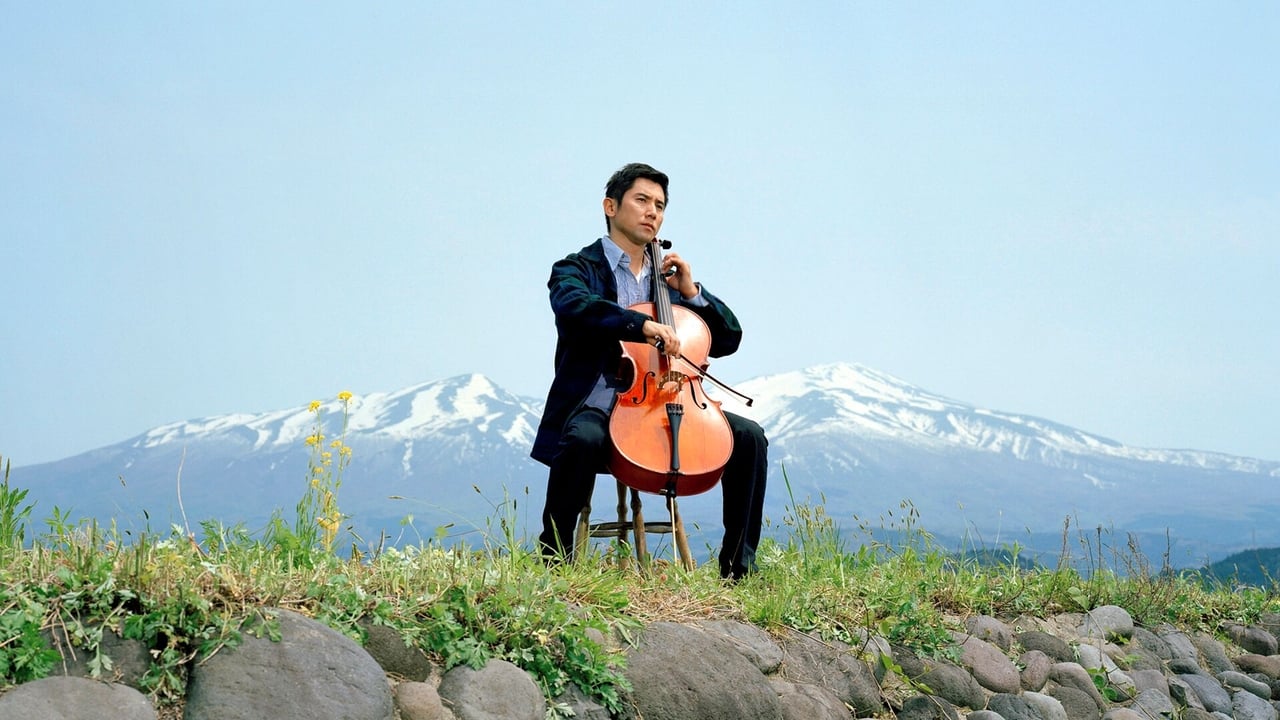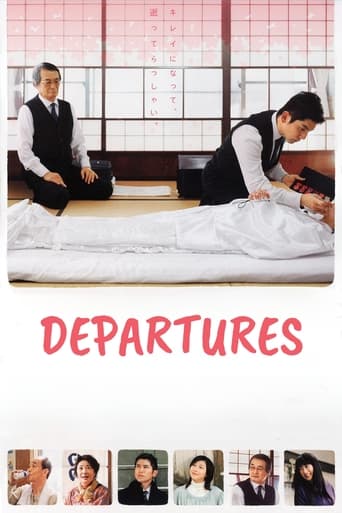

The opening vignette of Departures, much like how a dapper Jack Black gaily demonstrates the final cosmetic procedures before casketing in Richard Linklater's Bernie, reveals how the end of one's life can sometimes result in unexpectedly light moments. Faced with the uncertainty of what comes after death in an age of increasing agnosticism, families turn to humour as a way of shielding themselves from the heartbreak of a life now longer living with them. And what of those who service the departed, who are often caught in the midst of this torrent of emotional outpour? For Daigo Kobayashi, a recently dumped cellist, there is no easy answer. Faced with the uncomfortable discovery that the beautiful woman he is preparing was previously a man, he tries to be discreet, asking for the family's preference in a whisper. The ceremony itself is supposed to shroud the departed's bare skin from those in mourning. The camera even lowers itself to knee height, Ozu-style, as they enter the home and bow in solemn respect. But the parents return the whisper with a loud, tactless query, and the serenity is visibly shattered. Not that the victim cares. And it is only later that we learn that the moment serves as a realisation for the parent's love of their child, man or woman. In other encoffining jobs, Daigo is the odd man out as the ritual airs out old grievances and suppressed anger. Masahiro Motoki has the right face for the role; youthful, earnest, often bewildered, and when his dignified routine is interrupted by domestic quarrels, his eyes widen and his mouth is agape with quiet shock. What is the correct emotional response for a worker in these situations? He is paid to operate and witness the most vulnerable of moments, as generations break down and sob for their departed, and all he can do is provide a little solace through wood, cloth and petal. A bowing of the head seems sufficient, he initially believes.He works for Sasaki, played by Tsutomu Yamazaki. Some may recognise him as the cowboy hat wearing, John Wayne-esque nomad from the ramen western Tampopo, a gruff realist who sizes Daigo up with one look and offers him the job immediately (perhaps out of necessity rather than potential), but later scolds him like a child when he cannot bear the odour of a two week-old corpse. While Sasaki's demeanour is almost entirely austere, having taken on the lonely burden of this role, Daigo is practically hysterical, scurrying from public bus to private bathhouse to scrub physical filth and social taboo from the pores of his skin. There is a comedic 'skit' of sorts where he acts as a model corpse for Sasaki to demonstrate his craft upon, and shrieks when a razor pricks his cheek. The scene makes little logical sense; why would such a sparsely populated profession need a training DVD? But it does reveal Daigo to be the child he is, at least initially, not yet properly equipped with the maturity and life experience to handle the affairs of farewelling the dead. Music is presented as a significant motif; Daigo's expensive cello is sold in the beginning to escape debt and return to simple, rural living, but as he finds meaning in his new work (and cash), he is reunited with his childhood instrument. Gradually we discover it to be the heart of Daigo's conflicted nostalgia for the shack that once fronted as his mother's coffee shop. A sly shot from Takita circles the older Daigo engrossed in his art, before moving behind a pillar and smoothly transitioning to a younger boy rehearsing laboriously before his parents. Joe Hisaishi centres his score around the instrument, and in a pivotal musical montage, Daigo cradles the cello with the same finesse and grace that he now applies to the departed. His final catharsis lies in the act of encoffining his own estranged father, his work becoming deeply personal. The film's story is peppered with references to this childhood trauma, obscuring the father's face with the blurry haze of selective memory and choice shot compositions. To show the body and visage in clear focus is already monumental, and to witness Daigo caressing and preparing his father's body for a simple wooden coffin is more than enough. There is a lifetime of unspoken words in those gestures. Takita tacks on a cheesy, slow-motion revelation of a 'feeling stone' that he transfers onto the next generation, and explicit flashbacks, but it isn't necessary. The son is shaving the father. The cycle is complete.
... View MoreI really enjoyed watched the film Departures. This was my favorite film that we have watched this year. This film is about a man named Daigo who quit his passion of playing the cello. Daigo and his wife move back to his hometown in Northern Japan to look for a new living. Daigo finds an ad for a job in which he thinks is a travel agency. Once Daigo was hired, he found out he was actually working as a mortuary. He learns the rituals used in preparing the dead for their final rest. I enjoyed watching this film because it was extremely easy for me to follow, unlike other films I have watched. It is very easy to tell that this film is not American because there is barely any fighting or rivalries. I did not like the beginning of this film because the start of it was a very slow pace. The more I watched this film, the better it got. My favorite part of this film is how the main character, Daigo quits his one and only passion to find a new one. I was expecting that Daigo would have different life because he quits what he loves the most. I like how the director displayed Daigo's character to be bold and willing try new things even if he fails.
... View MoreThe film, "Departures," filmed and directed by Yojiro Takita, was a very well put together film, in my opinion. One of the main themes was somewhat creepy. This theme was funeral services in Japan. However, the film also focused on other things like family and the circle of life, which were both heartwarming to watch. Although the services were exotic and different as to how we celebrate and grieve for the dead in the United States, it was very interesting and gave the viewers a very cool global perspective. I would recommend this film to anyone who enjoys learning about different cultures, especially cultures in Asia, including Japanese culture. This movie also had some comical parts, so the film was not just depressing and interesting, but also funny at some points.
... View MoreThis was totally OK?Why the hell Netflix thought I would like it 5 stars worth is beyond me.About 30 minutes it dawned on me what it reminded me of - Sunshine Cleaners and one of any 100's of quirky, gentle mid-00's indie flicks about life upheavals.This was a thoroughly competent, Japanese version of one of those flicks. I kept expecting a big Gotcha! moment, the thing that would bring this to the top of the pile but it's not there. It is a thoroughly fine movie, that's it.
... View More